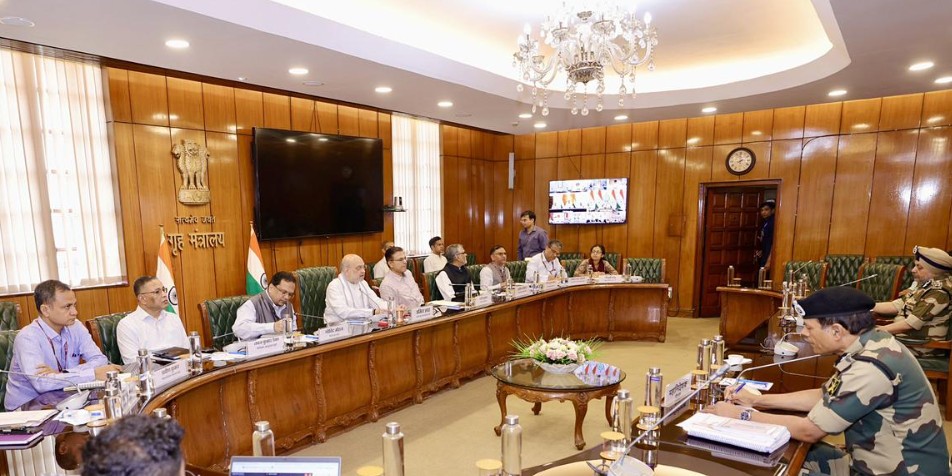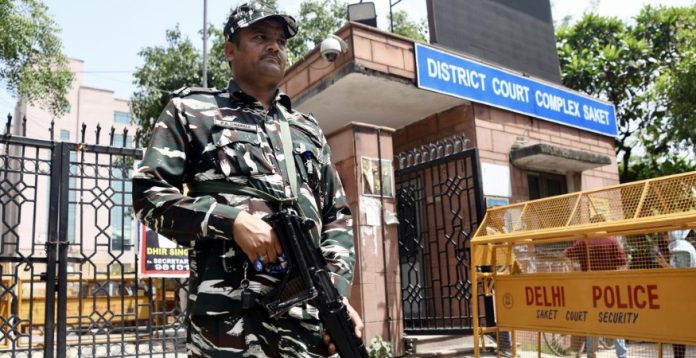Following the recent intensification of the security landscape in the northern region, particularly in the aftermath of the Indian armed forces’ “Operation Sindoor,” both Punjab and Himachal Pradesh have initiated comprehensive reviews and implemented heightened security measures to ensure the safety and security of their respective states.
In Punjab, where the border with Pakistan remains a sensitive zone, the state government has significantly tightened security protocols across the state. This move comes in the wake of India’s retaliatory strikes on terrorist infrastructure across the border, prompting concerns about potential cross-border reactions or attempts to disrupt peace within Punjab.
Chief Minister Bhagwant Mann has been at the forefront of these security enhancements, chairing high-level meetings with top police and administrative officials to assess the prevailing situation and strategize a robust security response. The focus is on increasing vigilance along the extensive border with Pakistan, which stretches for over 500 kilometers, making it susceptible to infiltration and cross-border activities.
Visible measures on the ground include a significant increase in patrolling by the Punjab Police, particularly in the border districts of Ferozepur, Pathankot, Fazilka, Amritsar, Gurdaspur, and Tarn Taran. These districts have been placed on high alert, with all public events being cancelled as a precautionary measure to avoid large gatherings that could become potential targets or be exploited by anti-national elements.
Security has also been stepped up at critical infrastructure, including railway stations, bus stands, and other transportation hubs, to prevent any untoward incidents. Additionally, security around sensitive installations, religious places, and educational institutions, especially those hosting students from Jammu and Kashmir, has been强化 to ensure their safety and instill a sense of security among the residents.

The Punjab Police is also working in close coordination with central security agencies, including the Border Security Force (BSF), which is the first line of defense along the international border. Joint patrolling and intelligence sharing have been intensified to pre-empt any attempts by hostile elements to infiltrate the state or carry out subversive activities. The state government has reiterated its commitment to maintaining peace and harmony in Punjab and has assured the public that all necessary measures are being taken to safeguard their lives and property.
Meanwhile, neighboring Himachal Pradesh has also initiated a comprehensive review of its security and communication systems in light of the evolving regional security scenario. While Himachal Pradesh does not directly share a border with Pakistan, it is strategically important and has witnessed a significant influx of tourists, making it imperative to ensure a robust security framework.
Chief Minister Sukhvinder Singh Sukhu convened a high-level meeting to assess the state’s preparedness across various fronts, including security, transport, communication networks, food and power supply, disaster management capabilities, and health services. The Chief Minister specifically directed the Deputy Commissioners and Superintendents of Police of all districts to enhance security measures and maintain a state of high alert.
A key focus of the review in Himachal Pradesh is the strengthening of the communication systems to ensure seamless coordination among various departments and agencies in the event of any emergency. This includes the operational readiness of emergency communication channels and protocols for disseminating information to the public effectively.
The state government is also paying close attention to sensitive areas and potential tourist hotspots, implementing measures to enhance surveillance and ensure the safety of visitors. Instructions have been issued to monitor social media closely to counter any potential spread of misinformation or propaganda that could disrupt peace and harmony.
As a precautionary measure, flight services at Gaggal airport in Shimla’s Jubbarhatti were temporarily suspended, highlighting the sensitivity of air travel in the current security context. The airport, however, remains open for use by defense forces if required, underscoring the state’s preparedness for any contingency.
Furthermore, mock drills and awareness campaigns are being conducted in various parts of Himachal Pradesh to educate the public about emergency procedures and enhance the overall preparedness of the state to deal with unforeseen circumstances. These drills include मॉक ब्लैकआउट exercises in urban areas like Shimla to test the response mechanisms during power outages, which could occur in emergency situations.
In conclusion, both Punjab and Himachal Pradesh have responded proactively to the heightened security environment in the region by implementing stringent security measures and reviewing their preparedness frameworks. Punjab, being a border state, has understandably adopted a more robust security posture along its frontier and in key urban centers. Himachal Pradesh, while not a border state, is taking necessary precautions to safeguard its residents and infrastructure by усиление security and ensuring the readiness of its communication and emergency response systems. These coordinated efforts underscore the commitment of both state governments to maintaining peace, security, and the well-being of their citizens in the face of evolving regional challenges.


